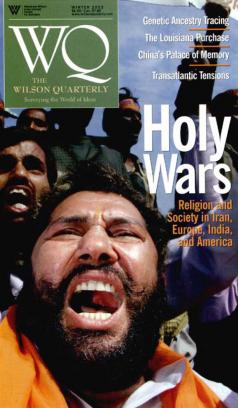Holy Wars: Religion and Society in Iran, Europe, India, and America


The new suburban "ideopolises" now hold the balance of power in national elections. Which way will they turn?
It's not just the United States that has found it almost impossible to regulate campaign contributions.
After confronting totalitarian ideologies in the last century, America may have trouble dealing with tyrants in the new one.
The world has too quickly forgotten America's long legacy of pro-Arab and pro-Muslim policies.
People admire charismatic corporate leaders such as Bill Gates and Jack Welch, but in most companies shared leadership roles are they key to success.
Grade inflation is a myth; the real problem is grades themselves.
It's been a long downhill slide, says Peter Berger, since sociology's golden age in the 1950s.
Large estimates of the U.S. Muslim population have been cropping up every since the 9/11 attacks. Too large, say some experts.
Can journalists learn the ropes at journalism schools? Most professionals think not, but curriculum changes could make a difference.
Ravenous plants are the stuff of science fiction, but today's scientists are using feisty flora to munch on a variety of manmade toxins.
Creating nonbreeders may hold the key to wiping out harmful species.
What accounts for the enduring fame of Gertrude Stein?
China and India have an overabundance of young men. If history is any guide, that should worry the rest of the world.
A Survey of Recent Articles
"Financing Politics: A Global View" by Michael Pinto-Duschinsky, in Journal of Democracy (Oct. 2002), 1101 15th St., N.W., Ste. 800, Washington, D.C. 20005.
"The NGO Scramble: Organizational Insecurity and the Political Economy of Transnational Action" by Alexander Cooley and James Ron, International Security (Summer 2002), 5 Cambridge Center, 4th Fl., Cambridge, Mass. 02142–1493.
"Why Do We Use So Many Checks?" by Sujit Chakravorti and Timothy McHugh, in Economic Perspectives (2002: Third Qtr.), Federal Reserve Bank of Chicago, 230 S. LaSalle St., Chicago, Ill. 60604–1413.
A Survey of Recent Articles
"Opposite-Sex Twins and Adolescent Same-Sex Attraction" by Peter S. Bearman and Hannah Brückner, in American Journal of Sociology (Mar. 2002), Univ. of Chicago Press, Journals Division, 1427 E. 60th St., Chicago, Ill. 60637.
A Survey of Recent Articles
"Prostitution and Sexual Autonomy: Making Sense of the Prohibition of Prostitution" by Scott A. Anderson, in Ethics (July 2002), Department of Philosophy, Northwestern University, 1818 Hinman Ave., Evanston, Ill. 60208–1315.
"Does Size Matter?" by Michael Scherer and "The Curse of Tom Wolfe" by Michael Shapiro, in Columbia Journalism Review (Nov.–Dec. 2002), 200 Alton Pl., Marion, Ohio 43302.
"Sugar Rush" by Karen Schmidt, in New Scientist (Oct. 26, 2002), 151 Wardour St., London, England W1F 8WE.
"A Distinctly Bluesy Condition" by Carlo Rotella, in The American Scholar (Autumn 2002), 1785 Massachusetts Ave., N.W., 4th Fl., Washington, D.C. 20036.
"A World Changed? Art Museums after September 11" by James Cuno, in Bulletin of the American Academy of Arts & Sciences (Summer 2002), 136 Irving St., Cambridge, Mass. 02138.
"Globalization and Taxation: Challenges to the Swedish Welfare State" by Sven Steinmo, in Comparative Political Studies (Sept. 2002), SAGE Publications Ltd., 6 Bonhill St., London EC2A 4PU, England.
FIRST AMONG EQUALS: The Supreme Court in American Life. By Kenneth W. Starr. Warner. 320 pp. $26.95
NARROWING THE NATION’S POWER: The Supreme Court Sides with the States. By John T. Noonan, Jr. Univ. of California Press. 203 pp. $24.95
FORCES OF HABIT: Drugs and the Making of the Modern World. By David T. Courtwright. Harvard Univ. Press. 277 pp. $24.95 hardcover, $16.95 paper
THE PURSUIT OF OBLIVION: A Global History of Narcotics. By Richard Davenport-Hines. Norton. 576 pp. $29.95
OUT OF IT: A Cultural History of Intoxication. By Stuart Walton. Harmony. 366 pp. $24
WHY A PAINTING IS LIKE A PIZZA: A Guide to Understanding and Enjoying Modern Art. By Nancy Heller. Princeton Univ. Press. 192 pp. $29.95 hardcover, $19.95 paper
REMEMBERING PATSY. By Brian Mansfield. Rutledge Hill Press. 95 pp. $14.99
JANE KENYON: A Literary Life. By John H. Timmerman. Eerdmans. 246 pp. $28
AUTHENTIC HAPPINESS: Using the New Positive Psychology to Realize Your Potential for Lasting Fulfillment. By Martin E. P. Seligman. Free Press. 321 pp. $26
IN DARWIN’S SHADOW: The Life and Science of Alfred Russel Wallace. By Michael Shermer. Oxford Univ. Press. 422 pp. $35
MATHEMATICS ELSEWHERE: An Exploration of Ideas Across Cultures. By Marcia Ascher. Princeton Univ. Press. 207 pp. $24.95
China's debate over whether to preserve or restore the ruined site of the great imperial palace complex of Yuanming Yuan shows how the Chinese are grappling with their past--and how they imagine their future.
Tensions between the United States and its European allies often ran high during the later days of the Cold War, but today’s conflicts are more numerous and frequently more severe—and they won’t be resolved without strong commitments from leaders on both sides of the Atlantic.
The Louisiana Purchase wasn't just the largest real estate deal in U.S. history. It forever altered the way America sees itself.
Technology now allows individuals to trace their genetic ancestry and claim an identity. That same process of genetic tracing might have less benign consequences for the larger society.
In Iran, where the failing government is Islamic, the colors of protest are of varying and often subtle secular hues.
As the influence of traditional religions wanes, Europeans feel a yearning for spiritual forces they do not control.
The word secular in India now signifies an approach that has crippled a great nation by suppressing its basic impulses.
Is religion a necessary part of American life?